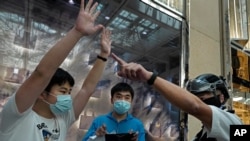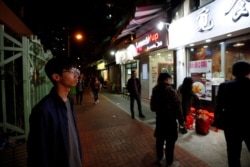Four young activists who belonged to a disbanded pro-independence group have been arrested on secessionist charges in Hong Kong’s first crackdown on political figures after the enactment July 1 of a sweeping national security law.
Senior Superintendent Li Kwai-wah, with Hong Kong police’s newly formed National Security Department, told reporters late Wednesday that four students between the ages of 16 and 21 had been arrested under the new national security law for “organizing and inciting secession” by their advocacy of independence.
He declined to name them and their group, but the group Studentlocalism announced on social media that its former convenor, Tony Chung, 19, had been arrested Wednesday night for “inciting secession.” Activists said at least two other former group members also had been arrested about the same time.
The arrests were the most high-profile crackdown on political figures since the introduction of the new security law. Ten protesters were arrested that day on national security charges.
'Hong Kong nation'
Li accused the group of announcing online the establishment of a new group to advocate for the establishment of a “Hong Kong nation,” as well as its declaration that it would use all means to achieve this end. He also alleged that the group was trying to “unite all pro-independence groups in Hong Kong” and “incite others to join them.”
Li said mobile phones, computers and documents had been seized from the arrested activists’ homes. He said the police could take DNA samples from them if necessary.
Citing clauses 36 to 38 of the national security law, Li emphasized that people also could be charged with criminal enterprises for “national security crimes” committed elsewhere in the world.
“We have jurisdiction even if the propaganda takes place abroad,” he said.
Studentlocalism announced its closure on the eve of the enactment of the national security law on July 1, but it also announced 10 days ago the establishment of its U.S. division. On its Twitter account, the group called on its supporters to join in, and it posted an online recruitment form.
Manifesto
Its manifesto on Twitter says one of its missions is to “establish a Hong Kong republic with independent sovereignty” and “awaken the will of Hong Kong’s national independence.”
Li said the arrestees were suspected of violating both Article 20 and 21 of the national security law, which criminalizes secessionist acts and incitement of others to commit such offenses.
In a video footage posted online, a plainclothes police officer, purportedly from the national security department, can be seen escorting Chung, who has his hands tied behind his back, to a vehicle.
Local media said it was the first time that officers from the police force's new national security department had made an arrest under the security legislation.
As the group disbanded June 30, Chung vowed on Twitter, “We won’t give up, we refuse to forget, one day we will witness the Hong Kong national flag on our land.”
Chung was arrested in May 2019 for damaging the national flag at the protest zone outside the legislature, before the anti-government protest movement began.
Ahead of the police briefing Wednesday night, officers expelled several journalists, saying they had not been registered with the government — even though no such restrictions had been put in place previously.
Commenting on the arrests, pro-democracy lawmaker Eddie Chu said the activists were not arrested for their actions but rather for their rhetoric on social media. “The maximum penalty is life imprisonment. Typical CCP [Chinese Communist Party] speech crime,” he said on Twitter.
Human Rights Watch researcher Maya Wang said the arrests were “a significant escalation on the part of the Hong Kong government, criminalizing those who organize political parties, and it's likely [to be] just the beginning before it moves onto pan-democratic parties.”






